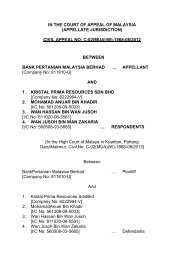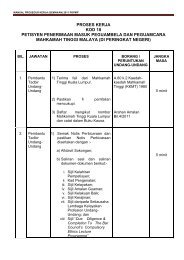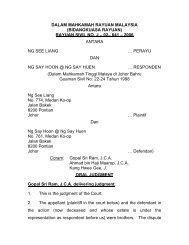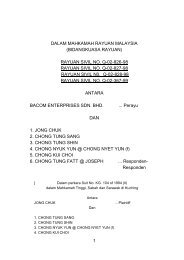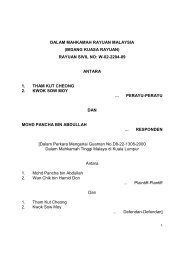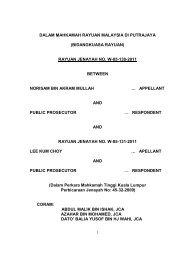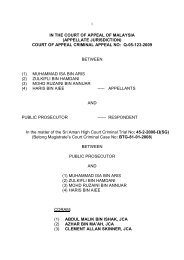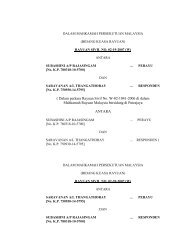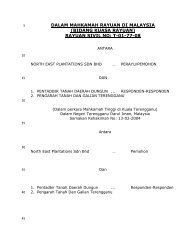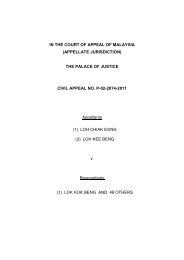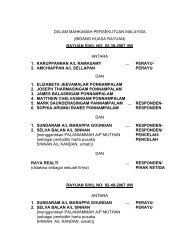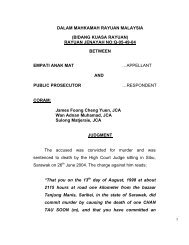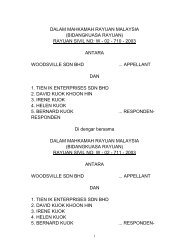in the court of appeal malaysia (appellate jurisdiction)
in the court of appeal malaysia (appellate jurisdiction)
in the court of appeal malaysia (appellate jurisdiction)
You also want an ePaper? Increase the reach of your titles
YUMPU automatically turns print PDFs into web optimized ePapers that Google loves.
an oppressive manner. The learned author <strong>the</strong>n went on to say<br />
at pp 143-144):<br />
It has frequently been stressed that s 320 is not <strong>in</strong>tended<br />
to provide m<strong>in</strong>ority shareholders with a means <strong>of</strong><br />
stultify<strong>in</strong>g <strong>the</strong> vot<strong>in</strong>g power <strong>of</strong> <strong>the</strong> majority: .…<br />
The mere use <strong>of</strong> vot<strong>in</strong>g power at board meet<strong>in</strong>gs or at a<br />
general meet<strong>in</strong>g to secure <strong>the</strong> pass<strong>in</strong>g <strong>of</strong> resolutions<br />
which <strong>the</strong> o<strong>the</strong>r members <strong>of</strong> <strong>the</strong> board or shareholders<br />
oppose, would not <strong>in</strong> general constitute oppression for<br />
<strong>the</strong> purpose <strong>of</strong> <strong>the</strong> section or for any o<strong>the</strong>r purpose. For a<br />
petition to succeed it must be shown that <strong>the</strong>re has been<br />
oppression <strong>in</strong> a real sense <strong>of</strong> members qua shareholders,<br />
and not merely a subord<strong>in</strong>ation <strong>of</strong> <strong>the</strong>ir wishes to <strong>the</strong><br />
power <strong>of</strong> <strong>the</strong> vot<strong>in</strong>g majority (Re Harmer Ltd [1959] 1<br />
WLR 62 at p 87 per Romer LJ).<br />
Hence, it does not constitute oppression for those <strong>in</strong><br />
control to <strong>in</strong>sist upon <strong>the</strong> adoption <strong>of</strong> a policy on a matter<br />
<strong>of</strong> bus<strong>in</strong>ess on which <strong>the</strong>re may be legitimate differences<br />
<strong>of</strong> op<strong>in</strong>ion, nor is it oppression if an exist<strong>in</strong>g state <strong>of</strong><br />
<strong>in</strong>equality results from <strong>the</strong> provisions <strong>of</strong> <strong>the</strong> constitution<br />
<strong>of</strong> <strong>the</strong> company and not from any action on <strong>the</strong> part <strong>of</strong><br />
those <strong>in</strong> control.<br />
The word ‘oppressive’ was def<strong>in</strong>ed <strong>in</strong> Re Harmer Ltd<br />
(referred to above) to mean ‘burdensome, harsh and<br />
wrongful’.<br />
In Elder & Ors v Elder & Watson Ltd (1952) SLT 112, with<br />
regard to <strong>the</strong> phrase oppressive to some part <strong>of</strong> <strong>the</strong> members’<br />
found <strong>in</strong> s 210 <strong>of</strong> <strong>the</strong> English Companies Act 1948 (which is<br />
<strong>the</strong> equivalent <strong>of</strong> s 181 <strong>of</strong> our Act), Lord President (Cooper)<br />
said (at p 113):<br />
… <strong>the</strong> essence <strong>of</strong> <strong>the</strong> matter seems to be that <strong>the</strong><br />
conduct compla<strong>in</strong>ed <strong>of</strong> should at <strong>the</strong> lowest <strong>in</strong>volve a<br />
visible departure from <strong>the</strong> standards <strong>of</strong> fair deal<strong>in</strong>g, and a<br />
violation <strong>of</strong> <strong>the</strong> conditions <strong>of</strong> fair play on which every<br />
shareholder who entrusts his money to a company is<br />
41



